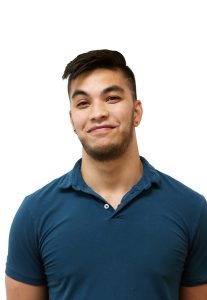New Faculty Focus: James McMaster
James McMaster, Assistant Professor of Gender and Women’s Studies and Asian American Studies.
Hometown: Wantage, N.J.
Educational/professional background: I was an undergraduate at Muhlenberg College in Allentown, Pennsylvania where I majored in theater (with concentrations in acting and performance studies) and minored in sociology. I got my MA in a program called Performance as Public Practice at the University of Texas at Austin, and I earned my PhD in Performance Studies at New York University.
How did you get into your field of research? I’ve always been very interested in theater and performance and what both can provide for minoritized subjects. This probably has something to do with the safety and sociality theatre provided for me as a queer kid of color growing up in rural New Jersey. I’ve also always been interested in the care practices that marginalized folks use to keep each other alive despite unforgiving conditions. This has something to do with the many beautiful, disenfranchised communities that I’ve come to call family—diasporic Filipino communities, queer communities, and so on. I went to grad school right after college because it was the only paying opportunity I was offered. I’ve been exploring these interests ever since.
What attracted you to UW–Madison? I have countless mentors—from undergrad, from grad school, from activist circles that I’ve been a part of—who have been shaped in some way by UW. So, there’s that. But, honestly, I’m here because my position, this joint appointment in Gender and Women’s Studies and Asian American Studies, seemed built for me. I’ve lived my life at the intersection of queerness and Asian Americanness. It’s where I’ve situated my research and a lot of my activism too. I feel very grateful to be provided this opportunity to study and teach what I know best, as my whole self—this kind of situation isn’t always in the cards for multiply-marginalized people in the academy, and I’m very aware of that.
What was your first visit to campus like? It was cold! And snowing! And stressful, because I was interviewing for my current job. But, thankfully, it quickly became clear that the people here are warm enough to compensate for all of that.
What’s one thing you hope students who take a class with you will come away with? Oh gosh, I don’t know that I can pick one thing. Here’s what I’ll say. The world we live in right now—structured as it is by systemic inequality—is not worthy of us. But it can be made worthy if we work together to make it so. I want my students to leave my class with these ideas in their bones.
Do you feel your work relates in any way to the Wisconsin Idea? If so, please describe how. My current project studies the ways that inequalities in caring relations (who is tasked with caring for others, who tends to receive care from others, etc.) are structured by race, gender, sexuality, disability, and other categories of otherness. Partially, my work is an attempt to map a few paths toward a more equitable distribution of care for all life on this planet, and I think of this effort as very much in line with the Wisconsin Idea.
What’s something interesting about your area of expertise you can share that will make us sound smarter at parties? Minoritized folks have developed a whole universe of unique care practices to address the ways that we experience harm in everyday life. These practices are what I try to describe and uplift in my work. If you’re at a party with these kinds of folks and you want to sound smarter (which is also to say, kinder) it’s important to master these care practices yourself. Easy, obvious things like using a gender nonconforming person’s correct pronouns and meeting a disabled person’s access needs are good places to start.
Hobbies/other interests: I love singing. That is, I love karaoke, and I’m also a connoisseur of really excellent singers.
Anything else you’d like to share about yourself or your work? I feel like I should say that I think of myself as an activist and an organizer as much as I think of myself as a scholarly. For me, and I’m not at all alone in this, organizing and theorizing are mutually constitutive activities and extensions of one another. I think this is why teaching is my favorite part of the job. It gives me a chance to conspire with others at the meeting point of theory and practice.





